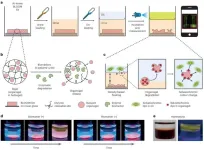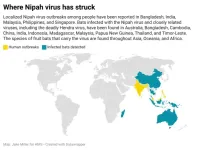(Press-News.org) Are dogs really the key to better health and a happier life? In this new study, dog owners were invited to describe the biggest benefits and challenges of dog ownership. The commitments and responsibilities of having a dog were found to be both a joy and a burden, highlighting the importance of making a conscious adoption choice.
The pet dog population has been growing worldwide. Often benefiting from good press in mainstream media, dog ownership is generally assumed to improve human lives, providing companionship and boosting well-being. While bringing a dog into the family does come with many benefits for a lot of people, the costs of dog ownership should not be overlooked. In fact, previous studies conducted on larger, representative samples of the population could not conclude on a generalisable “pet effect”:
pet owners are not always happier and healthier than non-pet owners.
Caring for a dog can be costly in time and money, but also emotionally. For instance, having a dog with behavioural problems or a long-term medical condition may elicit worry, sadness, and guilt. In the long run, these negative feelings might turn into chronic stress or depression.
The more people know about dogs, the more prepared they are for the reality of having one at home. Informing about the positive, but also the negative facets of dog ownership, may help prospective owners to engage in the adoption process more consciously. Yet, comprehensive overviews of the many costs and benefits of sharing life with a dog remain scarce. Which facets of dog ownership are considered the most costly, and which the most beneficial? How do dog owners perceive and describe the positive and negative aspects of their experience?
To find out, researchers at the Department of Ethology at Eötvös Loránd University (ELTE) first asked dog owners to rate a list of 33 neutrally-phrased statements related to pet dogs (such as “Dogs need to be trained and educated”, “Dogs can bring mess and dirt into the house”, “Dogs can keep children company”) on a scale from -3 (big disadvantage) to +3 (big advantage). Participants in the study were then invited to describe in their own words what were, for them, the biggest cost and the biggest benefit of having a dog.
The belief that dogs brighten people’s lives was found to be the most positively rated item from the list (2.78 on average), while the short lifespan of dogs was rated the most negatively (-1.67 on average). Adding up all ratings together, the authors noted that positive statements were, on average, rated much higher (2.06) than negative statements (-0.66), tipping the cost/benefit scales in favour of the positive side of the dog ownership experience.
“We were also interested to see if all of these facets of dog ownership could group together into bigger components” said Laura Gillet, PhD student at the Department of Ethology and lead author of the study. “In the end, we found three of them. The first one encompassed the emotional, physical, and social benefits of having a dog. The second one was more on the negative side, referring to the negative emotions and practical challenges arising because of the dog. The third and last component comprised aspects related to the commitment and responsibilities coming with dog ownership in the long term, including, for instance, the time that has to be dedicated to the dog’s daily care and training, as well as the influence of the dog on its owner’s routine and quality of sleep.” This last component divided dog owners the most: while it was positive for some, others saw it as a more neutral, or even as a negative aspect of dog ownership.
“We also analysed open-ended responses because they offer an even better understanding of the costs and benefits” explains Eniko Kubinyi, head of the Department of Ethology at ELTE and principal investigator of the MTA-ELTE ‘Momentum’ Companion Animal Research Group.
“More than sixty percent of dog owners spontaneously mentioned that the biggest benefit of pet dogs was the meaningful and valued relationship they developed with them.
Dogs were often described as honest, devoted and supportive social partners, showing unconditional, selfless love to their human family.” Daily life benefits were the second most frequently cited theme (31%), with owners mentioning that having a dog improved their lifestyle by encouraging physical exercise and outdoors activities, and brought stability and structure in their life. For 15% of respondents, another major advantage of sharing life with a dog was the opportunity to bond with a member of another species, whose intrinsic qualities were deemed numerous.
As for the biggest cost, dog owners were almost unanimous: caring for a dog costs money. Veterinary costs, feeding and other expenses were cited by 95% of the respondents. In comparison, emotional and practical costs were rarely mentioned, only by 4-5% of owners.
In summary, the results of this study show that the dog ownership experience is multifaceted and cannot be described in terms of universal costs and benefits that would apply to all owners. Most importantly, the researchers found that, depending on the owner, the commitment and responsibilities coming with dog ownership can be perceived just as much as beneficial as they can be perceived as an emotional and practical burden. Although a ratio in favour of the positive side of dog ownership was to be expected, especially in a sample of dog enthusiasts, it is also possible that some owners struggled with their dogs without being able to talk about it for fear of being judged and labelled as a “bad owner”. Therefore, the authors’ findings highlight the importance of publicly addressing not only the positive effects of pet dogs, but also the many challenges coming with dog ownership, to reduce the gap between expectations and reality and improve the lives of both humans and dogs.
The authors are currently running a new study to deepen the understanding of (dis)advantages of dog ownership. Dog owners across the world are invited to answer the following questionnaire: https://tally.so/r/nPXKPb
Original article: Gillet, L., Turcsán, B., Kubinyi, E. (2025). Perceived costs and benefits of companion dog keeping based on a convenience sample of dog owners. Scientific Reports. DOI: 10.1038/s41598-025-85254-1
Funding: The study was supported by the Hungarian Academy of Sciences via a grant to the MTA-ELTE ‘Lendület/Momentum’ Companion Animal Research Group (Grant No. PH1404/21). KE was also supported by the National Brain Programme 3.0 (NAP2022-I-3/2022), and LG by the DKOP-23 Doctoral Excellence Program of the Ministry for Culture and Innovation from the source of the National Research, Development and Innovation Fund. PR work was funded by MEC_N 149124.
END
Why you should (not) get a dog: the pros and cons of dog ownership
Are dogs really the key to better health and a happier life?
2025-01-21
ELSE PRESS RELEASES FROM THIS DATE:
After millennia as carbon dioxide sink, more than one-third of Arctic-boreal region is now a source
2025-01-21
After millennia as a carbon deep-freezer for the planet, regional hotspots and increasingly frequent wildfires in the northern latitudes have nearly canceled out that critical storage capacity in the permafrost region, according to a new study published in Nature Climate Change.
An international team led by Woodwell Climate Research Center found that a third (34 percent) of the Arctic-boreal zone (ABZ)—the treeless tundra, boreal forests, and wetlands that make up Earth’s northern latitudes—is now a source of carbon to the atmosphere. That balance sheet is made up of carbon dioxide (CO₂) uptake from plant photosynthesis and CO₂ ...
The reversal of lipoprotein alterations in patients with ischaemic stroke offers new perspectives for cardiovascular disease research and management
2025-01-21
A study recently published by researchers from the Sant Pau Research Institute (IR Sant Pau) and the Stroke Unit of Sant Pau Hospital in the Journal of Lipid Research provides new evidence on the essential role of the qualitative properties of lipoproteins, such as LDL and HDL, in the pathophysiology of cardiovascular diseases, including ischaemic stroke. The findings underscore the importance of going beyond traditional quantitative cholesterol levels to evaluate the risk of these pathologies.
Dr ...
Early diagnosis of bladder cancer, now conveniently at home
2025-01-21
Bladder cancer has a cure rate of over 90% when detected early, but it has a high recurrence rate of 70%, necessitating continuous monitoring. Late detection often requires major surgeries such as bladder removal followed by artificial bladder implantation or the use of a urine pouch, significantly lowering the patient’s quality of life. However, existing urine test kits have low sensitivity, and cystoscopy, which involves inserting a catheter into the urethra for internal bladder examination, is both painful and burdensome. This highlights the urgent need for a simple yet accurate diagnostic technology for patients.
The research team led by Dr. Youngdo Jeong of the Center for Advanced ...
People who are autistic and transgender/gender diverse have poorer health and health care
2025-01-21
Researchers at the Autism Research Centre at Cambridge University found that these individuals also report experiencing lower quality healthcare than both autistic and non-autistic people whose gender identity matches their sex assigned at birth (cisgender).
The findings have important implications for the healthcare and support of autistic transgender/gender diverse (TGD) individuals. This is the first large-scale study on the experiences of autistic TGD people and the results are published today in Molecular Autism.
Previous research suggests that both autistic people and TGD people separately have poorer healthcare experiences ...
Gene classifier tests for prostate cancer may influence treatment decisions despite lack of evidence for long-term outcomes
2025-01-20
Embargoed for release until 5:00 p.m. ET on Monday 20 January 2025
@Annalsofim
Below please find summaries of new articles that will be published in the next issue of Annals of Internal Medicine. The summaries are not intended to substitute for the full articles as a source of information. This information is under strict embargo and by taking it into possession, media representatives are committing to the terms of the embargo not only on their own behalf, but also on behalf of the organization they represent. ...
KERI, overcomes the biggest challenge of the lithium–sulfur battery, the core of UAM
2025-01-20
Dr. Park Jun-woo's team at KERI's Next Generation Battery Research Center has overcome a major obstacle to the commercialization of next-generation lithium–sulfur batteries and successfully developed large-area, high-capacity prototypes.
The lithium–sulfur battery, composed of sulfur as the cathode (+) and lithium metal as the anode (-), has a theoretical energy density more than eight times that of lithium-ion batteries, demonstrating significant potential. Additionally, it uses abundant sulfur (S) instead of expensive rare earth elements, making it cost-effective and environmentally ...
In chimpanzees, peeing is contagious
2025-01-20
A new study reported in the Cell Press journal Current Biology on January 20 is the first to describe a phenomenon researchers refer to as “contagious urinations.” The study in 20 captive chimpanzees living at the Kumamoto Sanctuary in Japan shows that, when one chimp pees, others are more likely to follow.
“In humans, urinating together can be seen as a social phenomenon,” says Ena Onishi of Kyoto University.
“An Italian proverb states, ‘Whoever doesn’t pee in company is either a thief or a spy’ (Chi non piscia in compagnia o è ...
Scientists uncover structure of critical component in deadly Nipah virus
2025-01-20
Scientists at Harvard Medical School and Boston University Chobanian & Avedisian School of Medicine have mapped a critical component of the Nipah virus, a highly lethal bat-borne pathogen that has caused outbreaks in humans almost every year since it was identified in 1999.
The advance, described Jan. 20 in Cell, brings scientists a step closer to developing much-needed medicines. Currently, there are no vaccines to prevent or mitigate infection with the Nipah virus and no effective treatments for the disease ...
Study identifies benefits, risks linked to popular weight-loss drugs
2025-01-20
Demand for weight-loss medications sold under brand names such as Ozempic and Wegovy continues to surge, with a recent study reporting one in eight Americans has taken or is currently using the drugs to treat diabetes, heart disease or obesity.
Formally, these drugs are known as glucagon-like peptide-1 receptor agonists (GLP-1RA) and include Mounjaro and Zepbound. Informally, media, patients and even some physicians have dubbed GLP-1 medications as “miracle drugs” because of the profound weight loss among users. While these health benefits are well established, information is sparse on the drugs’ effects across ...
Ancient viral DNA shapes early embryo development
2025-01-20
Over half of our genomes consists of thousands of remnants of ancient viral DNA, known as transposable elements, which are widespread across the tree of life. Once dismissed as the "dark side" of the genome, researchers at Helmholtz Munich and Ludwig-Maximilians-Universität (LMU) have now revealed their crucial role in early embryo development.
Unanswered Questions About the Role of Ancient Viral DNA
Transposable elements, remnants of ancient viral DNA, are reactivated during the first hours and days following fertilization. ...
LAST 30 PRESS RELEASES:
Kennesaw State's Vijay Anand honored as National Academy of Inventors Senior Member
Recovery from whaling reveals the role of age in Humpback reproduction
Can the canny tick help prevent disease like MS and cancer?
Newcomer children show lower rates of emergency department use for non‑urgent conditions, study finds
Cognitive and neuropsychiatric function in former American football players
From trash to climate tech: rubber gloves find new life as carbon capturers materials
A step towards needed treatments for hantaviruses in new molecular map
Boys are more motivated, while girls are more compassionate?
Study identifies opposing roles for IL6 and IL6R in long-term mortality
AI accurately spots medical disorder from privacy-conscious hand images
Transient Pauli blocking for broadband ultrafast optical switching
Political polarization can spur CO2 emissions, stymie climate action
Researchers develop new strategy for improving inverted perovskite solar cells
Yes! The role of YAP and CTGF as potential therapeutic targets for preventing severe liver disease
Pancreatic cancer may begin hiding from the immune system earlier than we thought
Robotic wing inspired by nature delivers leap in underwater stability
A clinical reveals that aniridia causes a progressive loss of corneal sensitivity
Fossil amber reveals the secret lives of Cretaceous ants
Predicting extreme rainfall through novel spatial modeling
The Lancet: First-ever in-utero stem cell therapy for fetal spina bifida repair is safe, study finds
Nanoplastics can interact with Salmonella to affect food safety, study shows
Eric Moore, M.D., elected to Mayo Clinic Board of Trustees
NYU named “research powerhouse” in new analysis
New polymer materials may offer breakthrough solution for hard-to-remove PFAS in water
Biochar can either curb or boost greenhouse gas emissions depending on soil conditions, new study finds
Nanobiochar emerges as a next generation solution for cleaner water, healthier soils, and resilient ecosystems
Study finds more parents saying ‘No’ to vitamin K, putting babies’ brains at risk
Scientists develop new gut health measure that tracks disease
Rice gene discovery could cut fertiliser use while protecting yields
Jumping ‘DNA parasites’ linked to early stages of tumour formation
[Press-News.org] Why you should (not) get a dog: the pros and cons of dog ownershipAre dogs really the key to better health and a happier life?









